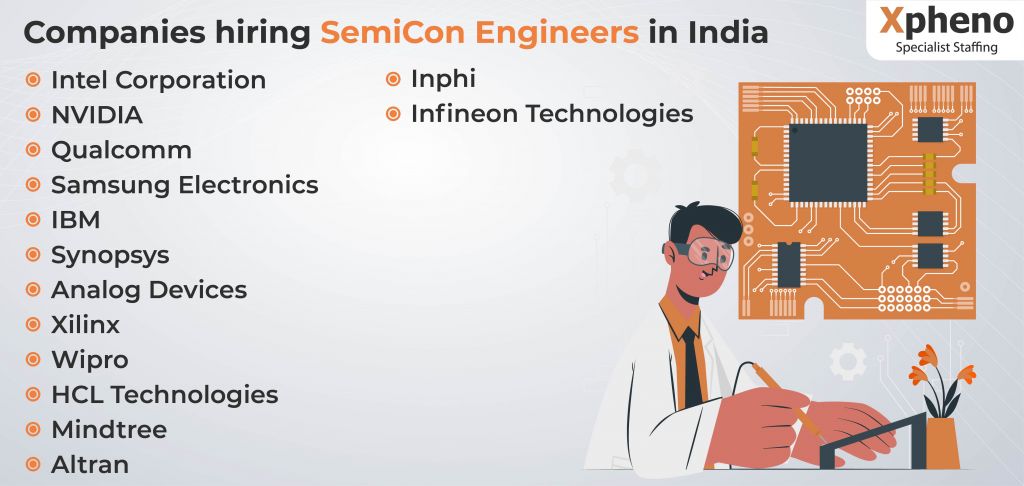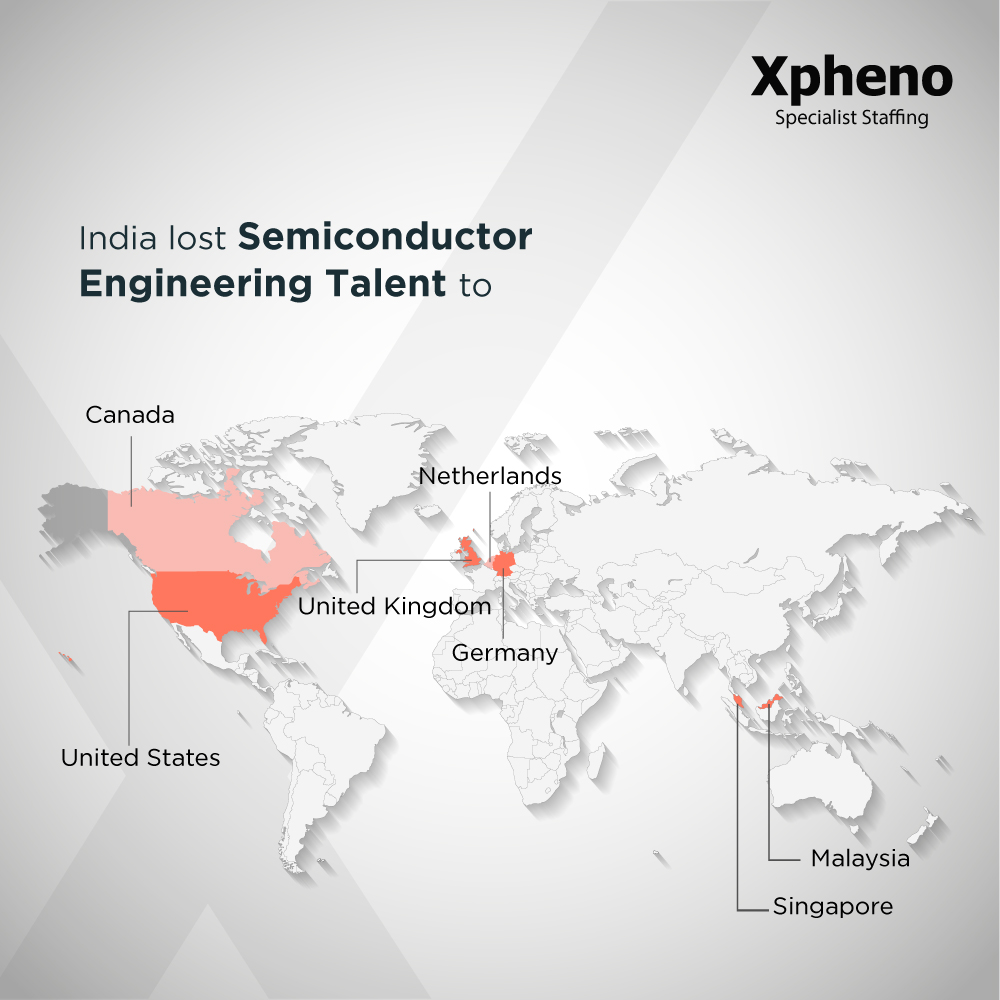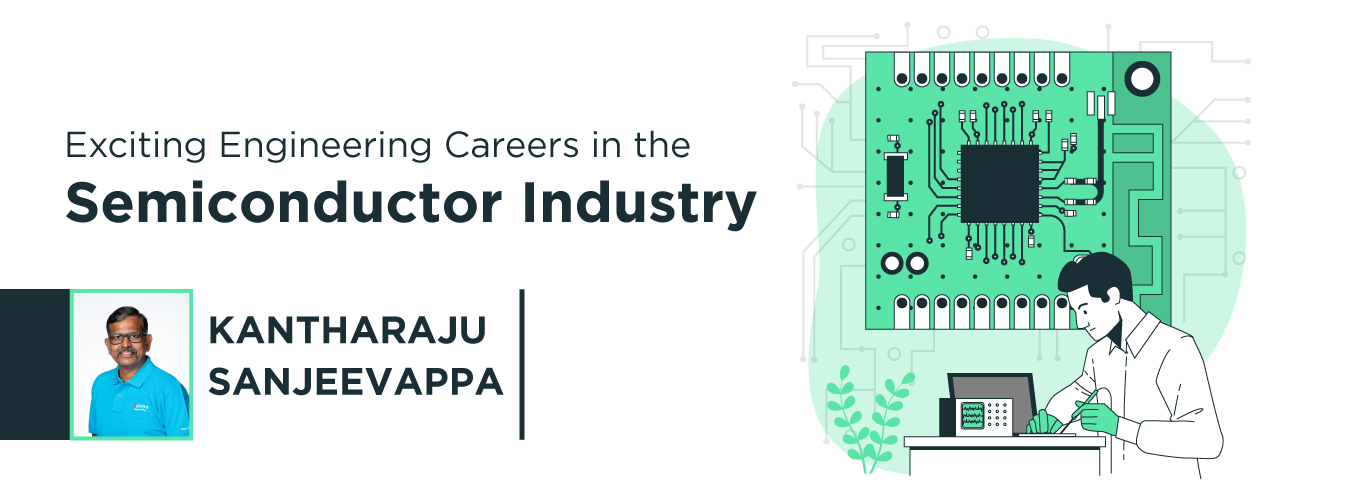In the past few years, discussions on worldwide chip shortage have been making headlines, Thanks to integrated circuits (ICs), which are an integral component of the digital world. The semiconductor industry returns to action after the pandemic by reviving its supply chains and increasing engineering value.
As the industry builds its momentum, it’s buzzing with opportunities for engineering professionals looking for meaningful and lucrative careers in this field. This engineering sector, with its massive demand and importance, has become an exciting industry to work in.
In this post, I will delve into the current hiring trends in semiconductor engineering and how you can become a part of this sector.
What is the Semiconductor Industry?
Over the past several decades, we have seen chips and semiconductors rise to become a major industry. Semiconductor chips are the heart and brain of almost every electronic gadget you use. Think about your everyday gadgets: smartphones, laptops, washing machines, gaming consoles, LED bulbs, microwaves, digital cameras, refrigerators, and so on.
All of these rely on semiconductors like integrated chips, diodes, and transistors to function smoothly. Since computers and other industrial systems rely on the SemiCon industry, it’s considered the core of all technology businesses.
Many enterprises are dedicated to designing, manufacturing, marketing, and selling IC semiconductors. These enterprises provide digital solutions for businesses across sectors, from video conferencing to ordering groceries, from sensors to autonomous cars. According to a May 2023 article from the Semiconductor Industry Organization, global sales of semiconductors hit a massive $574 billion mark in 2022.
The industry is only getting bigger with new emerging markets and technologies such as AI, robotic process automation, and 5G connectivity. So, it’s no surprise that it’s drawing professionals from various tech-driven fields.
Current hiring trends in the Semiconductor industry
The semiconductor industry currently has growing demand across industries, including consumer electronics, automotive, IT, and data centers. To meet this burgeoning requirement, the semicon industry is looking for adept specialists in IT, engineering, and digital skills.
The semiconductor industry absorbs talent majorly from the following key sectors:
- IT Services
- Computer Software
- Electrical and Electronic Manufacturing
- Automotive
- Telecommunications
- Consumer Electronics
- Cybersecurity
- Management Consulting
- Internet
As brought up earlier, semiconductors work at the core of all tech-driven industries. The COVID-19 pandemic further showed how important these chips are, as many industries couldn’t work properly when chip supply chains were disrupted. The pandemic also made us rely more on computers and smartphones, which use these chips. Therefore, countries all over the world are getting into semicon manufacturing. The US, Germany, Netherlands, United Kingdom, Singapore, Canada, and Malaysia are the top countries attracting Indian professionals into Semiconductor chip manufacturing.

India is also developing its own semiconductor ecosystem to flourish in the design and fabrication of chips. More than 30 Semiconductor design startups have set their base in India, including some from Silicon Valley, California.
Some important ongoing trends in the semiconductor industry, include:
- Creation of advanced AI chips
- Integration of IoT features into common devices
- Focus on making digital products smaller and more energy-efficient
- Expansion of 5G networks.
What Are the Key Responsibilities of a Semiconductor Engineer?
A semiconductor engineer plays a key role in designing and developing the essential components that drive electrical devices, essentially functioning as an electronics engineer. Their key responsibilities include:
- Design and develop components that power electrical devices, functioning as an electronics engineer.
- Tailor semiconductor designs to meet specific client requirements.
- Create electrical products for data management and transmission.
- Develop semiconductor systems and related software to enhance electronic device performance.
- Troubleshoot and resolve issues with electrical equipment to ensure optimal functionality.
- Monitor and evaluate the performance and efficiency of electrical systems.
- Design electrical chips or integrated circuits for various electronic devices.
- Use computer-aided design software to create detailed blueprints and models for components.
- Safely assemble and package electronic devices for shipment, adhering to industry safety standards.
Demand for Engineering talent in the Semiconductor Industry
According to the Semicon India Future Skills Talent Committee’s report, the Indian semiconductor sector will need a semiconductor talent workforce of 1.5 million by 2032 for activities such as chip design and fabrication.
Currently, the sector is majorly hiring professionals in design, manufacturing and R&D roles. It extends opportunities to engineers across diverse domains, including electrical engineering, hardware and software development, and telecom engineering.

There are two major categories of semiconductor engineering roles: VLSI Design Engineering roles and Fabrication of Semiconductors Engineering roles. Let’s dive into these roles to understand the diverse engineering prospects in the Semicon industry.
VLSI Design Engineering
VLSI (Very-Large-Scale Integration) design engineering encompasses a range of roles involved in designing, testing, verifying, and validating complex integrated circuits (ICs). These engineers are basically the architects of digital innovation, crafting chip designs that power our digital world. Essential VLSI design engineering skills include:
- Programming: Proficiency in languages like Verilog, VHDL, and scripting languages for automation and analysis.
- Problem-Solving: The ability to identify and troubleshoot issues in complex designs and systems.
- Knowledge of Semiconductor Manufacturing: Understanding the manufacturing process to design chips that can be feasibly produced.
The most prominent design engineering roles in the semiconductor industry include the following:
1. Digital Design Engineer
Digital Design Engineers are the architects of digital logic circuits. They use hardware description languages like Verilog and VHDL to bring complex systems to life. They head the creation of processors, memory units, and digital signal processing circuits that power our digital era.
2. Analog Design Engineer
Analog Design Engineer specializes in designing analog circuits like amplifiers, oscillators, and filters, considering performance, noise, and power trade-offs.
3. Mixed-Signal Design Engineer:
Mixing digital and analog expertise, these engineers create circuits interfacing both domains. Their work finds applications in RF communication from data converters to sensor interfaces.

4. Physical Design Engineer
Physical Design Engineers are tasked to transform concepts into reality by converting the logical design into a physical layout. This includes the placement and routing of circuits on chips to meet performance and manufacturing constraints.
5. ASIC Design Engineer
They design application-specific integrated circuits (ASICs) tailored for specific functions. Through their skills, these professionals mold circuits to optimize performance for a specific application.
6. FPGA Design Engineer
FPGA Design Engineers design circuits on Field-Programmable Gate Arrays (FPGAs). These circuits find applications in prototyping, testing, and hardware acceleration implementation.

7. Design for Test (DFT) Engineer:
DFT Engineers ensure chips are testable during manufacturing by implementing structures like scan chains and boundary scan cells. These Integrated test structures enable the testing of different parts of the chip, ensuring that defects can be detected during the manufacturing process.
8. Verification Engineer
Verification Engineers ensure design correctness through simulations and formal methods. They use the Universal Verification Methodology (UVM) and develop test benches and test vectors to verify complex designs against specifications.
9. Circuit Design Engineer
Circuit Design Engineers create transistor-level designs. They optimize the performance, power, and area of the individual building blocks of semiconductors.
10. RF Design Engineer
RF Design Engineers specialize in radio frequency (RF) applications, such as wireless communication systems, considering high-frequency signal intricacies.
11. Power Integrity Engineer
Power Integrity Engineers ensure that the power distribution network on the chip can handle power consumption and fluctuations.

12. Signal Integrity Engineer
Signal Integrity Engineers preserve the integrity of high-speed signals on chips, considering reflections and signal degradation challenges.
Semiconductor Fabrication Engineering Roles
Semiconductor fabrication is the intricate process of creating integrated circuits (ICs), microchips, and other electronic components that serve various purposes, from consumer electronics to industrial machinery. These processes take place in specialized facilities called semiconductor fabs or foundries being established around the world.
Engineers working in semiconductor fabrication are highly skilled professionals working with cutting-edge technology to ensure quality and precision at every step of the process.
Process Engineer
Process Engineers develop and optimize the manufacturing processes that produce ICs and silicon chips. They master photolithography, etching, deposition, and diffusion techniques, aiming to enhance device yield, performance, and quality of semiconductors.
Equipment Engineer
The fabrication process involves complex tools and equipment. Equipment Engineers specialize in maintaining and optimizing this machinery. From etchers to photolithography tools, their expertise ensures equipment reliability and uptime.
Process Integration Engineer
Here, the focus is on orchestration. Process Integration Engineers organize the seamless integration of various fabrication steps, ensuring compatibility and seamlessness. They also ensure that fabricated devices meet design specifications.

Materials Engineer
As the name suggests, Materials Engineers select and characterize the materials used in fabrication. From silicon wafers to chemical solutions, they study material properties to ensure optimal compatibility.
Metrology Engineer
Metrology Engineers develop and deploy precise measurement tools and techniques to validate the properties of devices and materials. With an eye for detail, they ensure that every element meets stringent specifications.
Quality Control Engineer
Quality Control Engineers implement rigorous testing and quality control processes for the semiconductor devices. They keep an eye on defect density and manufacturing yield, maintaining the industry’s high standards.
Yield Enhancement Engineer
Yield Enhancement Engineers tackle the challenge of increasing the number of functional devices per wafer. Through meticulous analysis of defect data and process parameters, they engineer strategies to enhance manufacturing yield.

Chemical Engineer
Semiconductor Fabrication involves chemical processes like chemical vapor deposition, wet etching, and cleaning processes. Chemical engineers master these processes and ensure safety while also embracing environmental considerations.
Automation and Control Engineer
They automate and optimize manufacturing processes with control systems, ensuring consistent operations.
EHS Engineer
EHS Engineers ensure compliance with safety and environmental regulations within semiconductor facilities. Implementing protocols to safeguard employees, the environment, and the community ensures responsible operations.
Facility Engineer
These engineers manage semiconductor fabrication infrastructure, including utilities and cleanrooms. They ensure an ideal environment for innovation to thrive in fabs.
R&D Engineer
Meet the innovation catalysts. R&D Engineers advance semiconductor fabrication through research and development of new materials, techniques, and technologies.

Failure Analysis Engineer
Failure Analysis Engineers investigate and diagnose device failures, defects, and issues that emerge during manufacturing or afterward. Their problem-solving skills keep operations on track.
Wafer Fab Engineer
Wafer Fab Engineers oversee the entire wafer fabrication process. Coordinating different engineering teams ensures harmonious and smooth operations, enabling the creation of complex semicon devices.
How to get into Semiconductor Engineering
Given the current high demand for their services, semiconductor engineers are expected to have certain specialized skills to stand a chance in this competitive industry.
Gain the skills
To start your career as a semiconductor engineer, you typically need a bachelor’s degree in Engineering, Material Science, or Applied Physics with a strong foundation in electrical engineering, chemical engineering, computer engineering, or a related field.
Enterprises also prefer candidates with backgrounds in software engineering, information technology, and information systems. Some positions may require a master’s or doctoral degree or specialized semiconductor courses. Expertise in data analysis and processing, engineering design, manufacturing process engineering and troubleshooting is common for most semicon engineering roles.
Stay on top of industry trends
Semiconductor engineers often face challenges like increasing complexity in circuit designs, shrinking component sizes, and keeping up with rapid technological advancements. They also need to navigate the ever-evolving landscape of semiconductor fabrication processes and standards.
Hence, enterprises often seek candidates with a combination of theoretical knowledge, practical skills, and the ability to work with cutting-edge technology. Most importantly, a drive for continuous learning and growth will help you excel in semiconductor engineering.
Apply for jobs
If you’re someone who enjoys working with cutting-edge technology and creating digital solutions, there has never been a better time for you to get into this exciting industry.
You can start by researching semiconductor design and manufacturing enterprises hiring engineers. LinkedIn, Naukri and other job portals give access to job postings in varied fields worldwide. Optimize your skills and your resume, and quickly start applying for jobs to get a leg up on a potential offer in the semiconductor industry.
Xpheno also recruits talent with specialized skills for semiconductor, automotive OEMs, Aerospace, and other high-growth sectors like Fintech, Agritech, logistics, IT services companies, and GCCs of marquee corporations.
If you are looking to make a career as a VLSI Design engineer or semiconductor fabrication engineer, check out engineering jobs in the semiconductor industry on our portal.


